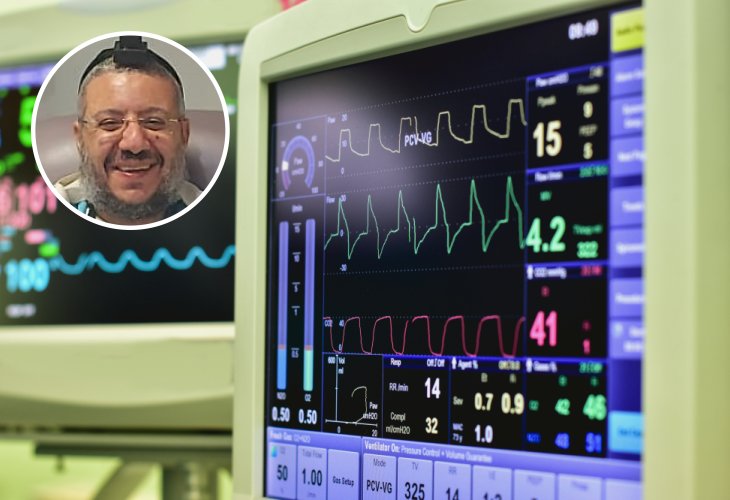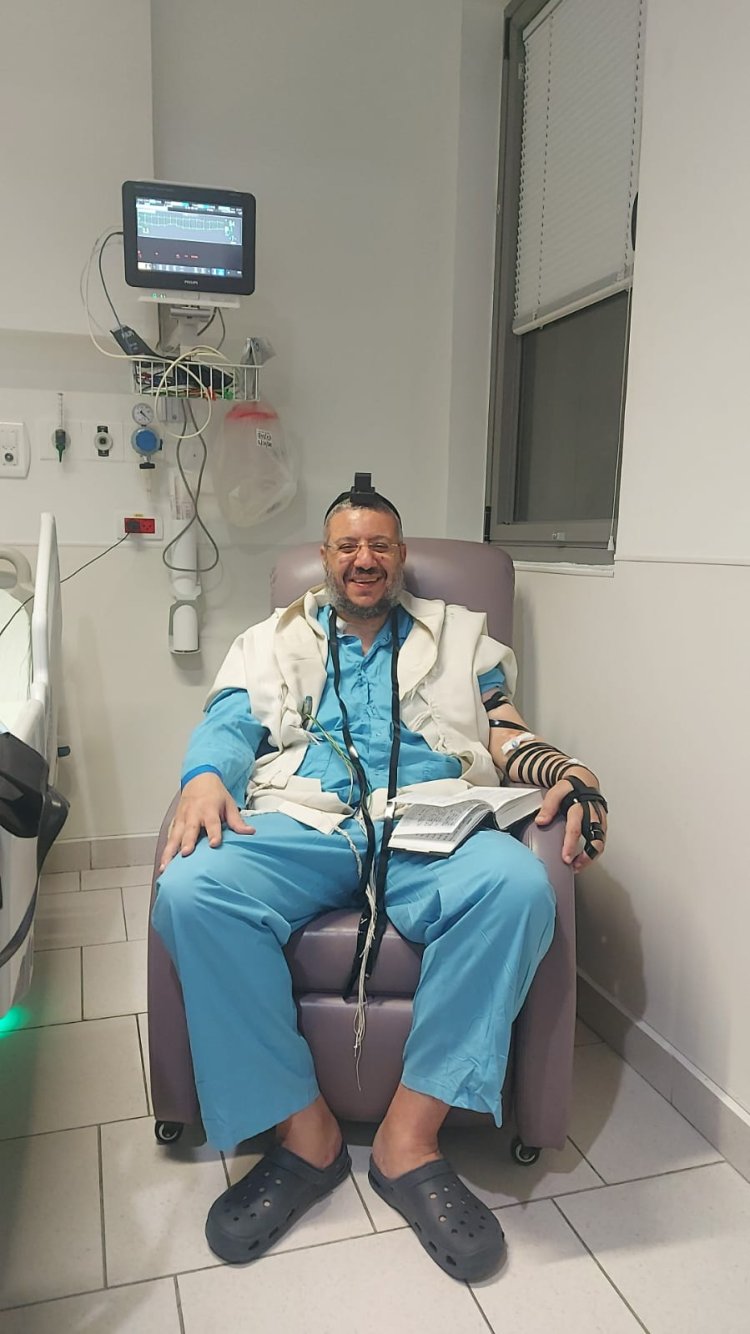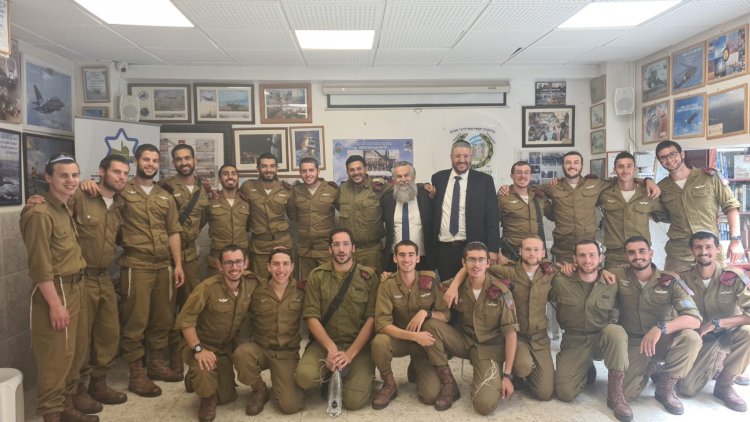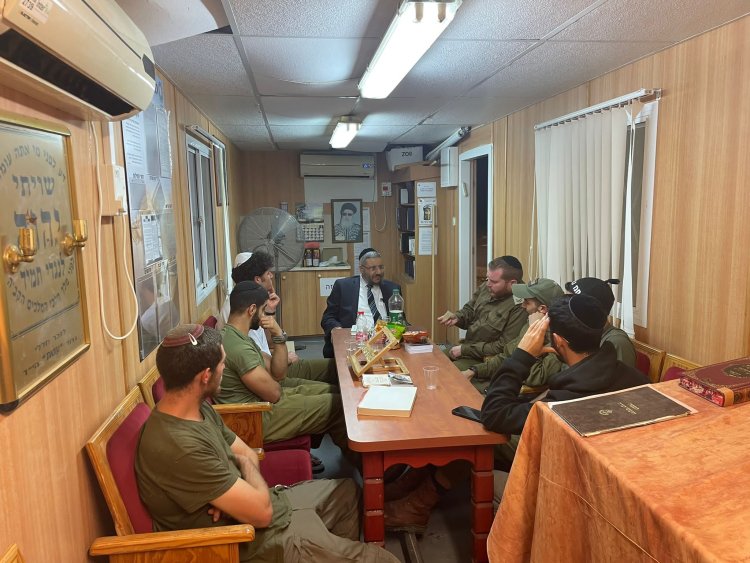"The Doctor Burst into Tears: 'I Resuscitated You, How Could You Be in This State?'"
When Rabbi Avraham Benisho suffered cardiac arrest, doctors warned his wife about the potential consequences. Yet, the following day brought an unexpected turn of events. How are IDF soldiers involved?

"Stop everything and recite Psalms for the recovery of Rabbi Avraham Benisho who suffered a cardiac arrest." If you received this message two weeks ago, you can breathe a sigh of relief. Rabbi Avraham Benisho from Ashdod, who hovered between life and death, recovered with the help of Hashem and great miracles that defy medical explanation.
"I visited the hospital this week for a short check-up," shares Rabbi Benisho, "and doctors from all departments came to see if I was the patient who underwent 45 minutes of resuscitation and emerged without damage. When they saw me functioning, walking, and moving around, they stood around me in tears."
It turns out that not only the doctors are excited, but also many Jews across the country who know Rabbi Benisho, often called "the Rabbi of the Soldiers" because he lectures to soldiers and offers guidance and charity. He is active in various charitable works and counsel.
"We Might Not Succeed in Saving Him"
Rabbi Benisho doesn't remember the day of the cardiac arrest, as it seems "erased from memory," but his wife Esther recounts: "My husband complained for a week and a half about chest pressure, but neither of us imagined it was a precursor to a heart attack. He was young and healthy with no background illnesses, so why think of such a thing? That's why when he came home that day, collapsed on the bed, and told me, 'I don't feel well, call an ambulance,' I was in shock. Initially, I suggested, 'Why an ambulance? I'll take you to the hospital.' But he was beyond conversation. I immediately called the emergency services who realized the seriousness of the situation, provided brief treatment, and then transported him to the hospital in an intensive care unit."
Esther didn't understand the severity then, thinking her husband would undergo some tests and return home. "I was with our small children, so I sent our 18-year-old son with my husband and promised him that I would come to the hospital after putting the kids to bed. Luckily, my son grasped the situation better than I did and contacted our married son to join them at the hospital. I stayed in touch by phone and heard they were taking my husband to the emergency room. Suddenly, I heard my son shout, 'My dad isn't breathing! He's all blue!' Then there were shouts of 'Resuscitation!'
Esther didn't need much more to understand. She rushed to the hospital, learning upon arrival that her husband was in trauma care after cardiac arrest, receiving resuscitation. "The miracle was that the cardiac arrest happened at the hospital, not minutes earlier at home," she explains. "It was a blessing that we got him to care on time, but doctors warned that his condition was dire. They said survival of the resuscitation wasn't guaranteed, and even if it succeeded, they couldn't predict his state afterwards. Sitting outside the emergency room, I was devastated. In my imagination, I feared the worst. Then I reminded myself of the adage, 'Even if a sharp sword rests on one's neck, never despair of mercy.' I decided not to give up. I sent a brief message to several WhatsApp groups asking for Psalms and prayers: 'My husband is in critical condition. Pray he recovers healthily,' and sent the messages. After that, I left my phone and wasn't able to check it until the evening."

(Recovering in hospital)
Prayers and Pleas
Esther reports that a doctor came out and informed her that the resuscitation was successful, though it was unclear how her husband would wake, due to the oxygen deprivation during the 45-minute ordeal. He also updated her that her husband was being taken for catheterization and would then be in intensive cardiac care.
Esther found herself oscillating between despair and hope, mainly reading Psalms and receiving support from her in-laws. "It was a grueling day, full of tears and heartily prayers," she recounts. "By evening, when I finally checked my phone, I was astounded by the hundreds of messages that poured in. My few messages had spread far and wide, and many who knew my husband forwarded them further. I received uplifting responses from many people, some thanking my husband's influence for their spiritual growth and praying fervently for him, even from abroad. It was indescribable support at a truly challenging time."
Late that night, Esther managed to enter the intensive care unit to see her husband. "The doctors permitted me four minutes by his bedside," she recounts. "He was swollen, sedated, and connected to many tubes. Somehow, I had the courage to take his picture, promising myself to show it to him after recovery so he'd realize the magnitude of the miracle."
As she left the ward, doctors informed her they planned to reduce sedation the next day at noon to assess her husband's response. She was cautioned "not to expect much, as the extent of any damage was unknown."
"They didn't even question 'if' there would be damage; it was just a matter of its severity," she recalls painfully.
That night was restless for Esther, filled with prayer and dialogue with the Creator. The next day, after her children left for school, she returned to the hospital as doctors prepared to reduce the sedation. "At noon, they started lowering the sedation, and within half an hour, they called me into the room. There I saw my husband with opened eyes, repeatedly asking, 'Can someone tell me what happened?' Seeing me, he visibly relaxed. He seemed unaffected, but I hesitantly asked him, 'Do you know who I am?' To which he replied, 'Of course, you're my wife Esther.'"
"The doctors were in awe," Esther narrates. "That morning, they'd told me even if he regained consciousness, he'd have a prolonged hospitalization followed by extensive rehab. Yet, it seemed like everything was changing. They called a speech therapist who brought him food, and he tried drinking and chewing, albeit with some pain from the ventilation. It was clear he could eat, so they removed the feeding tube."

(Bringing soldiers closer)
On the Miracles
Rabbi Benisho doesn't recall these moving moments, with his memory resuming on the second midnight in the hospital. "I woke up alone in a dark room, briefly thinking I'd been kidnapped to Gaza," he describes. "Realizing I was in a hospital only dawned when Hebrew-speaking staff entered, though I didn't understand why. Trying to rise from bed to use the restroom, I started removing tubes from my body myself. Having done so, I stood and headed to the restroom. Inside, I heard shouting, presumably searching for someone. I told an approaching staff member, 'There's no one here,' to which he replied, 'It's you we're looking for. Who brought you here?' When I said I came alone and removed the tubes myself, he laughed heartily and helped me back to bed, instructing me not to leave until the doctors approved."
From then, Rabbi Benisho received visits from doctors checking his memory. "Each asked the same: my name, phone, wife's name, and kids' names," he recounts. "I didn't understand the repetition, so I suggested writing the answers down to save time. Their laughter was inexplicable to me."
Only the following day did he grasp the enormity of the miracle, when the original doctor who identified his condition visited in tears, suggesting a tour of the rehabilitation ward to see others struggling to move months post-cardiac arrest as he was fully recovered in a day. "Doctors recounted their perspectives on the miracle, not anticipating my rapid discharge. Yet, I left by week's end, their letters noting the unprecedented miracle of my case."

(Rabbi Benisho delivering a lecture)
Did you ever ponder why you received such a great miracle specifically?
"Certainly, it’s a constant thought," he admits. "People suggest it’s my communal work, but I attribute it directly to the prayers from countless Jews for my recovery. Even now, over two weeks later, I hear from people who prayed and shared incredible stories. In a health clinic visit, twenty individuals approached, each stating commitments like beginning Shabbat early in my honor, completing Psalms, or praying for me. Some weren't observant, yet received my name and prayed. The clinic manager stepped out to request we recite a Psalm of thanks together. I was deeply moved; no doubt the prayers and merit of the Jewish people supported me through challenging hours."
These days, Rabbi Benisho notes he's recovering at home but plans to soon resume his spiritual outreach and charity activities. "Now, I feel an even greater duty," he says, "seeing the widespread awakening in the Jewish people, I'm committed to continuing this endeavor actively."

